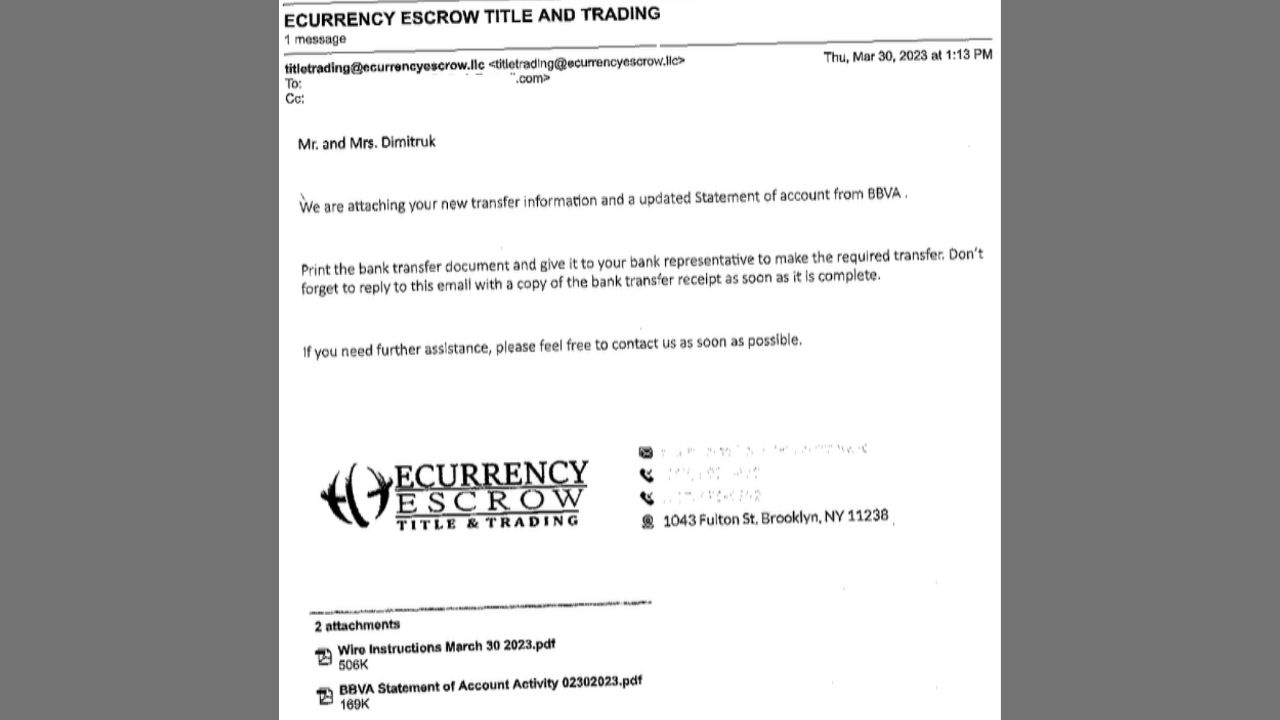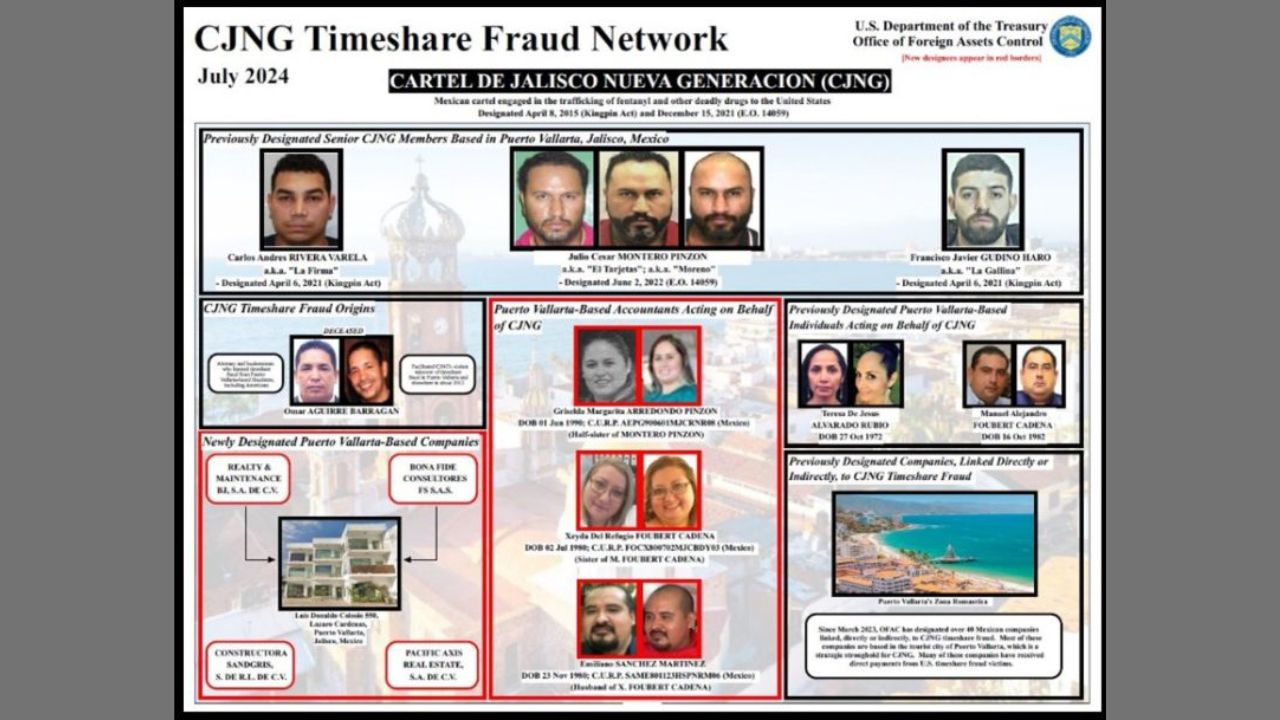The FBI is issuing a stark warning to timeshare owners about a widespread telemarketing scam linked to a violent Mexican drug cartel. This scheme targets unsuspecting property owners, leading to significant financial losses. Here’s what you need to know and how to protect yourself.
GET SECURITY ALERTS, EXPERT TIPS – SIGN UP FOR KURT’S NEWSLETTER – THE CYBERGUY REPORT HERE

The Dimitruk’s devastating timeshare scam experience
In late 2022, Mr. and Mrs. Dimitruk, a retired Canadian couple, received a call about selling their Florida timeshare. The scammers, aware of their specific timeshare details, promised a Mexican buyer willing to pay above market value. The fraudsters employed an intricate process involving a fake New York escrow company, ecurrencyescrow[.]llc. The Dimitruks were asked to complete forms and wire over $3,000 for “administrative” and “processing” fees.
For almost a year, the scammers made additional financial demands, citing various taxes and fees. The couple even sent $5,000 to pay off their remaining timeshare balance, believing it was part of the sale process. Mr. Dimitruk, a 73-year-old retired long-haul truck driver, revealed in an interview with KrebsOnSecurity that they lost over $50,000 to this scam. Even after this substantial loss, the scammers continued to contact them, claiming their money was waiting and urging further payments.

Credit: KrebsOnSecurity
OUTSMART THE SCAMMERS: HOW THE SNEAKY CEO APPLE GIFT CARD SCAM ALMOST GOT ME
Cartel connections to fraud schemes
The FBI has linked these timeshare fraud schemes to the Jalisco New Generation drug cartel in Mexico. According to a July 2024 warning from the FBI and FinCEN, these scams are part of the cartel’s efforts to diversify their revenue streams and finance other criminal activities, including drug trafficking.
Since at least 2012, the cartel and other Mexico-based transnational criminal organizations have increasingly targeted U.S. owners of timeshare properties in Mexico, particularly older adults who are often more vulnerable to such scams. The proceeds from these fraudulent activities not only support the cartel’s operations but also contribute to the manufacturing and trafficking of dangerous substances like fentanyl into the United States.
8 PHISHING SCAMS TO WATCH OUT FOR THIS HOLIDAY SEASON
How these scams work
The Jalisco New Generation Cartel has expanded its criminal activities beyond traditional drug trafficking into sophisticated scams, including timeshare fraud targeting unsuspecting individuals, particularly Americans. Here are some of the methods employed by the cartel in executing these scams:
Impersonation of legitimate entities: Scammers often pose as legitimate real estate agents, escrow companies, or even officials from U.S. government agencies like the Treasury Department. This tactic is designed to instill a sense of trust and urgency in potential victims, making them more susceptible to fraud.
Targeting vulnerable populations: The cartel primarily targets elderly Americans who own timeshares in Mexico. These individuals are often contacted with offers to buy their timeshares at inflated values, but they are required to pay various fees upfront, such as taxes or closing costs, before any transaction can be completed. Once these payments are made, the scammers disappear, leaving victims with significant financial losses.
Use of call centers: The CJNG operates illegal call centers where employees, often unaware of the cartel’s true nature, engage in telemarketing schemes. These centers are strategically located in regions with high unemployment rates, providing a pool of workers who may be desperate for jobs. The call centers not only facilitate scams but also serve as a means for the cartel to exert control over local populations through intimidation and violence.
Complex fraud schemes: The scams can involve multiple layers of deception. For instance, victims may be contacted multiple times by different scammers posing as various professionals (e.g., lawyers or real estate agents) who claim they can assist with selling their timeshares or recovering lost funds. This re-victimization often leads to further financial exploitation.
Violence and intimidation: The cartel employs extreme measures to maintain control over its operations and silence potential whistleblowers. Reports indicate that workers attempting to quit these call centers have faced dire consequences, including murder, which serves as a chilling message to others considering leaving the cartel’s employment. This brutal enforcement mechanism not only protects their operations but also instills fear within communities.
Digital infrastructure: The CJNG utilizes a network of fraudulent websites and domains that appear legitimate at first glance. These websites often mimic real escrow and real estate firms, making it difficult for victims to discern the authenticity of their interactions. Many of these domains have been linked back to a central hub that manages multiple scam operations simultaneously.
By understanding these operational tactics, you can better appreciate the complexities and dangers associated with scams perpetrated by organized crime groups like the Jalisco New Generation Cartel. This knowledge is crucial for potentially preventing future victimization.

Credit: Credit: US Department of the Treasury’s Office of Foreign Assets Control
THE AI-POWERED GRANDMA TAKING ON SCAMMERS
Protecting yourself from timeshare scams
To avoid falling victim to similar scams, it is crucial to take proactive steps to safeguard your financial interests:
1) Verify the buyer’s identity and offer legitimacy: Always confirm the identity of any potential buyer and the authenticity of their offer. Contact the timeshare company directly to validate any claims made by the buyer.
2) Research any company that contacts you: Conduct thorough research on any business reaching out to you. Look for reviews, complaints, and verify their credentials through reliable sources.
3) Be wary of upfront fees: Legitimate transactions typically do not require upfront fees for administrative or processing purposes. If a company requests such payments, exercise caution.
4) Use secure communication channels: Avoid sharing personal or financial information over unsecured methods such as phone calls or emails. Opt for secure communication channels whenever possible.
5) Do not click on links: Avoid clicking on any links or downloading attachments from unsolicited emails. Scammers often use these tactics to steal your personal information. The best way to safeguard yourself from malicious links that install malware, potentially accessing your private information, is to have antivirus software installed on all your devices. This protection can also alert you to phishing emails and ransomware scams, keeping your personal information and digital assets safe.
Holiday Special for CyberGuy Readers: My #1 pick is TotalAV, and you can get a limited-time deal for CyberGuy readers:
- Option 1: $19 / 5 licenses (protects 5 devices)
$19 your first year (80% off) for the TotalAV Antivirus Pro package. Includes licenses to protect 5 devices
- Option 2: $14.95 / 3 devices (protects 3 devices) (ends 12/25, 3pm ET)
$14.95 your first year (85%) for the TotalAV Antivirus Pro package. Includes licenses to protect 3 devices.
6) Consult with professionals before proceeding with transactions: Seek advice from a real estate attorney or a trusted financial advisor before engaging in any transactions. Their expertise can help you navigate potential pitfalls.
7) Report suspicious activity to authorities: If you suspect you’ve been targeted by a timeshare scam, don’t hesitate to promptly report it to local authorities, the FBI’s Internet Crime Complaint Center (IC3) at ic3.gov, or the Federal Trade Commission (FTC). Reporting can help protect others from falling victim to similar schemes.
8) Invest in personal data removal services: While the advice provided is valuable, the most crucial step in protecting yourself from such scams is to minimize your online presence. By reducing the amount of personal information available on the web, you make it significantly harder for scammers to target you. No service promises to remove all your data from the internet; however, having a removal service is great if you want to constantly monitor and automate the process of removing your information from hundreds of sites continuously over a longer period of time.
A service like Incogni can help you remove all this personal information from the internet. It has a very clean interface and will scan 195 websites for your information and remove it and keep it removed.
Special Holiday Deal for CyberGuy Readers (65% off – lowest price anywhere – ends 12/25, 3 pm ET): Incogni offers a 30-day money-back guarantee and an exclusive CyberGuy discount available only through the links in this article. Pricing is just $5.24/month for an individual plan (billed annually) or $11.54/month for a family plan (up to 4 people), both providing fully automated data removal services, including recurring removal from over 190 data brokers. You can add up to 3 emails, 3 home addresses and 3 phone numbers (U.S. citizens only) and have them removed from data-broker databases. I recommend the family plan—it breaks down to only $2.89 per person per month for comprehensive, year-round coverage. This is an outstanding service, and I highly recommend giving it a try to see the benefits for yourself.
Get Incogni here
Get Incogni for your family (up to 4 people) here
Kurt’s key takeaways
Here’s the deal. These timeshare scammers are clever, they’re persistent, and they’re backed by some seriously bad dudes. But don’t let that scare you into inaction. Remember, knowledge is power. By staying informed and skeptical, you’re already one step ahead of these fraudsters. Trust your gut – if something feels off, it probably is. And don’t be afraid to ask for help or report suspicious activity. Let’s make life a whole lot harder for these scammers and keep your hard-earned money where it belongs – in your pocket.
What additional steps do you think authorities should take to combat telemarketing scams targeting vulnerable populations? Let us know in the comments below.
FOR MORE OF MY SECURITY ALERTS, SUBSCRIBE TO MY FREE CYBERGUY REPORT NEWSLETTER HERE
Copyright 2024 CyberGuy.com. All rights reserved. CyberGuy.com articles and content may contain affiliate links that earn a commission when purchases are made.




















 English (US) ·
English (US) ·